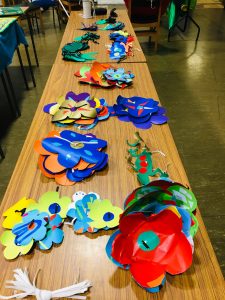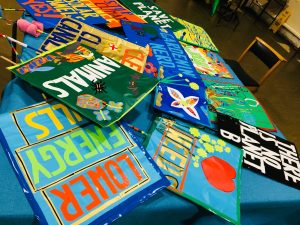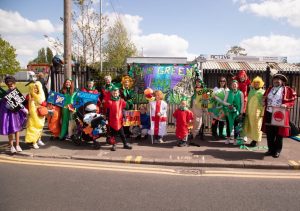Our Green and Pleasant Land
Written by Dr Jenna C. Ashton
Patriotism meets climate campaigning in ‘Our Green and Pleasant Land!’
Throughout April 2022, a small artist-researcher team held workshops with families in Miles Platting and Newton Heath Libraries and at Miles Platting St Cuthbert’s Church, Manchester UK, to create ‘Our Green and Pleasant Land’ – a contribution to Manchester’s St George’s Day Parade 2022, inspired by William Blake’s poem ‘Jerusalem’, and reinterpreting the legends of St George for our times. Over 70 family members made 63 flowers, 13 double-sided placards, 8 10-ft garlands, and 1 large walking banner – all of which will be reused in 2023. A core group of families wearing costumes by House of Haynes walked with us on the day, handing out packets of seeds to spectators. Approximately 2000 people lined the parade route. A 6-minute documentary film of the project is available here.
Residents in North and East Manchester have led the St George’s Day Parade for 17 years, halting for 2 years due to the Covid-19 pandemic. For 24 April 2022, we proposed to create an environment-focused section of the parade with the organisers and residents, titled ‘Our Green and Pleasant Land’. Climate and environment campaigners are rarely connecting into nationalism or patriotic discourses or groups. The parade offered an opportunity to connect into different community perspectives and experiences of land, belonging, care, and initiating climate awareness as part of a resident-led patriotic activity.
‘Our Green and Pleasant Land’ contributes to the wider research project ‘Community Climate Resilience through Folk Pageantry’ (Creative Climate Resilience) 2020-23 (AHRC/UK Climate Resilience Programme, REF: AH/V003186/1/), led by principal investigator Dr Jenna C. Ashton.
Project aims and how these support SALC social responsibility aims:
- Engaging our communities: The project continues to evolve embedded creative engagement and arts research practice by Dr Ashton and Prof Kevin Malone with communities and residents in North Manchester, deepening relationships and understanding via participation in, and supporting of, resident-led interests and activities. The project also worked to connect across perceived divisions between residents in the area through environmental and patriotic interests.
- Cultural or creative engagement: The project supported the valuing of residents’ cultural expression and creativity, and connected arts practice research with community folk practices. The project promotes the role of arts practice for ecological and environmental engagement.
- Environmental Sustainability: The project uniquely aimed to connect environmental and climate interests into St George’s celebrations, widening potential audience engagement with local sustainability and issues of climate mitigation and adaptation.
- Promoting equality and diversity: Miles Platting and Newton Heath is an underserved ward in Manchester. This project continues to find creative ways to support the participation in environmental and climate decision-making by people from low-income groups and those with other disadvantages (e.g. illness, disability) who face multiple climate injustices. Notably, the residents in this ward contribute least to climate emissions and are more likely to face adverse effects, yet participate least in decision-making which shape policy and practice. Levels of participation in political action and civil society associations closely correlate with income, education, and occupation so that action tends to favour opinions and perspectives of those relatively advantaged over the disadvantaged. Perceptions of unfairness in process and outcome affect the willingness of communities to act, which includes climate adaptation. Despite their inherent limitations, empirical understandings of geographical patterns of vulnerability and disadvantage help to raise awareness of who is most affected, where, and why. Yet multiple challenges remain for engaging and developing appropriate actions with disadvantaged individuals and communities.
‘Our Green and Pleasant Land’ has been adopted as the title for our 2023 project pageant. A creative piece by Dr Ashton, “The Ballad of St George”, forms the poetic basis of the pageant, soon to be published in Manchester zine Shock City, issue “Toxic City”.
Project duration: April – May 2022
Project leads: Dr Jenna C. Ashton (Institute for Cultural Practices, SALC, UoM), Prof Kevin Malone (Dept. of Music, SALC, UoM)
Internal partner: Prof Sarah Lindley (Dept. of Geography, SEED, UoM)
External partners:
- Manchester St George’s Day Parade Committee
- Manchester City Council
- A Bird in the Hand Theatre
- Jackie Haynes and House of Haynes
- Manchester Libraries (Miles Platting and Newton Heath)
- Miles Platting St Cuthbert’s Church
- Miles Platting Community and Age Friendly Network
- Groundwork
- Canal & River Trust
- Kenawa Films
Audience feedback:
“After watching your little film we realised just how much work went into your ‘Green and Pleasant Land’ theme. We would welcome any group that want to put in as much time and dedication as your group. I hope it inspires other groups to do the same. Thanks again and hope to see you with us next year”
St George’s Day Parade Committee
“‘Our Green and Pleasant Land’ was the perfect opportunity to get the House of Haynes fruit and veg costumes down from the loft out of storage and back out onto the streets where they belong. The climate emergency placards made by the people wearing the costumes were the best possible costume accessory for drawing attention to climate injustice and what urgently needs to be done. Onwards together fellow beans and berries!”
Jackie Haynes, collaborating artist
“For the first time in its long history, this year Manchester’s annual St George’s Parade included a float dedicated to raising awareness of climate change and promoting climate action.
Residents were brought together through the Creative Climate Resilience project, to design and craft placards and decorations, all from repurposed materials. The passion for climate action was evident in all ages that took part. Our youngest marcher in the parade was just 6 months old!
CCR is a shining example of how engaging communities through creative means like crafting and storytelling, can ensure that every person is able to express climate change concerns and channel that into positive action.
It’s a pleasure to support the CCR project and the impact it’s having in some of our city’s most vulnerable communities. I look forward to being a part of that impact growing and intensifying as we look towards the next stages in 2023″
Ash Farrah, Climate Officer, Manchester City Council
Funding sources: SALC Social Responsibility Award, Arts and Humanities Research Council






0 Comments